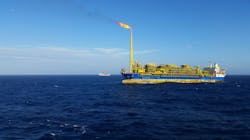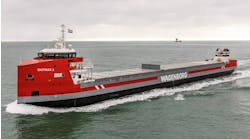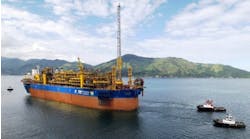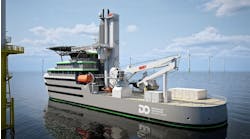Offshore staff
LONDON — The offshore sector has sanctioned a total of 1.9 Mboe/d of floating production system (FPS) throughput capacity so far this year, with a further 180,000 boe/d set to be approved before year-end, according to Westwood Global Energy Group.
Altogether, 13 associated FPS units have been commissioned with an EPC value of $15 billion, 9% up on the figure for 2021. Ten are FPSOs and three are semisubmersible production platforms.
However, inflation and global supply chain issues have caused certain E&P companies to delay their EPC contract awards for major FPS projects, said Mark Adeosun, director of Westwood’s SubseaLogix & PlatformLogix service.
At the start of the year, Westwood anticipated 25 FPS units being ordered, with an EPC value of $19 billion. But delays/changes in development concepts for Equinor’s Wisting project in the Barents Sea, Shell’s Gato do Mato of Brazil, Shell’s Linnorm in the Norwegian Sea and Santos’ Dorado off Western Australia have led to a 14% downward revision.
Offsetting this, the EPC contract value for Petrobras’ P-80, P-82 and P-83 FPSOs has turned out to be higher than initially forecast.
Next year, Westwood anticipates an upgrade to Cenovus Energy’s Sea Rose FPSO off eastern Canada, while CNOOC may still award an EPC contract this month for its Deepwater 2 floating production semisubmersible (FPSS).
Despite the project delays, 2022 will have the highest FPS throughput capacity sanctioned since 2010, Adeosun claimed, adding that next year’s newly sanctioned FPS throughput capacity could total 2.2 MMboe/d, with an overall EPC value of $16 billion.
Major EPC awards will likely include Petrobras’ P-81, P-84 and P-85 FPSOs, and Equinor’s Pao de Acucar offshore Brazil. Other decisions on FPS units to watch for are Azule Energy’s Agogo FPSO and TotalEnergies’ Cameia FPSO, both offshore Angola, Eni’s Baleine FPSO off Côte d’Ivoire, and Woodside Energy’s Trion FPSS offshore Mexico.
Over the past five years, the EPC cost of FPSOs has fallen, averaging $7,950/boe/d of throughput capacity compared to $12,795/boe/d observed over the 2013-14 period. But an increase in active EPC tenders and industry costs has pushed this year’s average EPC figure to $9,310/boe/d, 32% higher than 2020 during the peak of the COVID-19 pandemic.
Rising costs are causing significant delays to major projects, and lingering concerns over shipyard capacity could worsen supply chain constraints. Further price pressures could lead to extended delays for projects such as Equinor’s Rosebank (west of Shetland, UK) and Bay Du Nord (offshore Newfoundland), Shell’s Bonga SW (Nigeria) and TotalEnergies’ Block 58 development (Suriname).
12.09.2022




